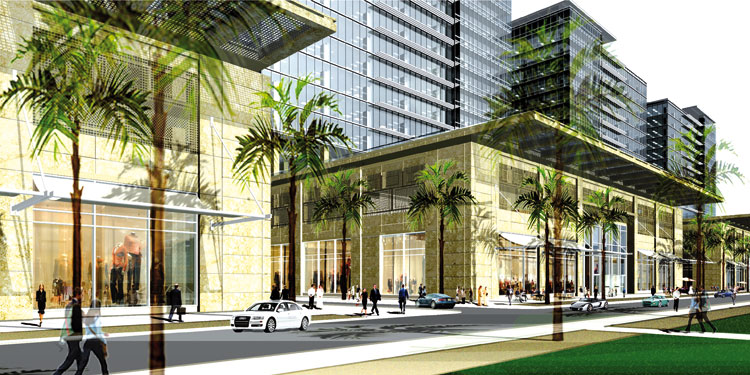|
Building on excellent standards at
Downtown Jebel Ali
Stretched across Sheikh Zayed Road for eleven kilometres between
Jebel Ali Free Zone and Dubai Waterfront, Downtown Jebel Ali
will eventually cater
for around 235,000 people...
Downtown Jebel Ali is the first major project in the Downtown
area, and Al Habtoor Engineering is currently constructing four
buildings in this mammoth project. Limitless, the real estate
development arm of Dubai World, unveiled the details of its
first development project in Dubai back in November 2006.
Less than two years later, the project - Downtown Jebel Ali – is
rapidly taking shape. Stretched across Sheikh Zayed Road for
eleven kilometres between Jebel Ali Free Zone and Dubai
Waterfront, Downtown Jebel Ali will eventually cater for around
235,000 people. With 326 buildings, 237 of which will be
residential, the development’s design includes pedestrian
walkways and congestion-free areas.
Downtown Jebel Ali consists of four quarters - East Quarter,
East Central, West Central and West Quarter. Each quarter is
divided into three individual districts with business,
residential, shopping, dining and entertainment facilities.
Al Habtoor Engineering was selected to begin the construction of
the first four commercial buildings. Akhbar AlDar met with
Brendon Baines, who at the time was the Project Director for the
first phase of development and also the Operations Manager for
Al Habtoor Engineering Dubai, to find out a little more about
how the project has progressed. He is now the Operations Manager
for the Sorbonne University project in Abu Dhabi.
The scope of the construction required comprises four Class A
office buildings and the project value totals AED 580 million.
Each structure has two basement levels, a ground floor, a podium
level and 12 floors, and the four towers are linked by a glass
façade which connects the frontage and conceals the extremely
fancy design of the lobby interior.
According to Brendon, the erection of the common façade was a
complex process involving two 250 ton cranes. “We had to place
three major trusses in between the buildings, and then hang a
further 12 individual wind-braced trusses before we could even
think about fitting the glass.
It was all completed relatively smoothly, once the initial
logistics had been dealt with. ” The glass cladding had been
specially shipped in from Italy so it was essential there were
no problems, as to reorder items would have caused a lengthy
delay.

Brendon ensures the project runs like clockwork with daily
meetings in which he briefs on-site staff, which include two
project managers and four construction managers. Brendon says he
likes to keep them in healthy competition with each other,
encouraging them all the way and empowering them to make strong
decisions and further their careers.
The project also utilised a new stone cladding system for the
first time in the UAE. The MASA system was developed by Spanish
company, Sistema Masa, and is an innovative way of applying
stone cladding to the frontage of a building. The weight
resistant and durable fixings can be adjusted in 3D without
forcing the cladding panels. They are also safe and easy to
mount, plus require no maintenance. This pioneering method of
attachment effectively creates ventilation, as an ‘air chamber’
is formed between the two elements, providing continuous
insulation.
The development features its own dedicated chilled water plant
and sewerage treatment plant, both of which will eventually be
available to other Downtown Jebel Ali projects in the vicinity
as they come on board.
In addition to the construction contract, Al Habtoor Engineering
has been awarded the additional AED 80 million contract for the
surrounding landscaping, which includes rooftop gardens.
Furthermore, Al Habtoor Interiors has secured the interior
design of the building’s common areas, installing wooden doors,
feature walls and the lavish reception area. Stone has been
imported from Italy, with ceramics from China; a truly global
operation.
Safety is paramount at Al Habtoor Engineering, and Downtown
Jebel Ali is no exception. There is a tremendous emphasis on
safety issues, and the UK-based project management company,
Bovis Lend Lease, has additionally implemented a special Injury
and Incident-free system.
With up to 2,500 personnel on site at any one time, it is
essential that safety standards are strictly adhered to; hence
the scheme includes regular workshops for project managers and
engineers, and rewards employees with certificates and prizes
for initiative.
Building standards are also key, and Burt Hill, the American
project engineers and architects, has incorporated the UL - or
Underwriters’ Licence - system. This classification has
extremely high standards and is another excellent system being
brought to the local construction industry. With time critical
on the project, a challenging development schedule was proposed
at the outset, which was even more testing when you consider
that there were almost twenty subcontractors working at the
development. But despite the short timelines, the project has
been an interesting one.
Brendon and his team are enjoying the process of working with
Limitless and he is hoping that this may be the start of a
longer term relationship. Limitless is the developer of the
Arabian Canal, the biggest and most complex civil engineering
project ever undertaken in the Middle East.
To work on such a high profile project would be a great
challenge for many of the employees at the Al Habtoor Leighton
Group, so the team is hoping they will have the opportunity to
replicate the successes of Downtown Jebel Ali for the Arabian
Canal.
|